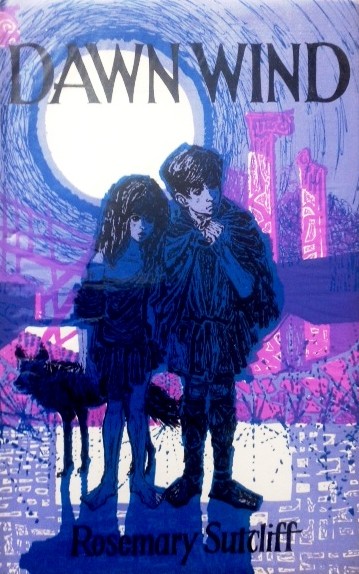Inspiring Young Readers
 posted on 01 Jun 2022
posted on 01 Jun 2022
Dawn Wind by Rosemary Sutcliff
Sutcliff (1920 – 1992) was a prolific author of what we’d now call young adult fiction and, in particular, historical novels with compelling action and strong storylines. Possibly her most famous book is The Eagle of the Ninth which focused on the Roman occupation of Britain (and is reviewed here on this site) but Dawn Wind takes us forward in time to the next wave of conflict with the arrival of the Saxons.
The Romans have gone but the Roman-Britains left behind can’t stop the onward march of the invading Saxons and in the bloody final battle of Aqua Sulis (Bath) the British army is slaughtered. Few survive and our story starts as Owain, a fourteen year old boy, staggers wounded from the battle and is joined by a fighting dog, he simply calls Dog, who will be a long-time companion.
The story, much too complex to reproduce here, tells the story of how Owain tries to find his way to the south coast with the idea of getting across to Gaul in the hope of joining up with other survivors but – and we pretty much guess this from the outset – this isn’t going to happen. He befriends a feral girl, Regina, he finds in the wreckage of Viroconium, avoids criminal bands of looting Britains and is eventually taken into slavery by Saxons in a deal to save Regina’s life. Against all odds he flourishes and will eventually earn his freedom and is even destined to witness the arrival of St. Augustine on Britain’s coast.
It’s a tense and atmospheric story, full of meticulously researched detail. Life in early Saxon Britain is harsh and unforgiving – there’s no place here for sentiment and Owain is forced to take death, suffering and loss in his stride. The key to the success of the book is the superb recreation of the past. Reviewing the book for Slightly Foxed in 2021, Sue Gaisford describes this masterful descriptive power in this way:
“…in Dawn Wind, the fifth of her novels on Roman and post-Roman Britain, Rosemary Sutcliff is, as always, bang on the money: there is a great deal of heavy cold rain in this book. Her language is vigorous and frequently new-minted: we hear ‘the faint tripple of a horse’s hoofs’ on the old Roman road; we see the moon striking ‘little jinks of light’ from a battered breastplate, while a busy stream goes ‘brawling down the hill’; cornered, a snarling wild boar fixes us with ‘eyes red like the sullen gleeds of a burnt-out fire’.”
It’s not just that Sutcliff writes engaging historical drama that makes the book so engaging but her capacity to capture what we might imagine to be ‘real life’ – the domestic and personal lives that were being lived. Importantly this not only makes the characters recognisably three-dimensional but also brings them closer to us: despite the years between Owain and us, he’s recognisably shares our contemporary concerns.
I’m giving the final word to Julia Eccleshare writing in The Guardian in 2016 and making reading recommendations for the young adult market:
“In a loose series of titles which includes The Eagle of the Ninth and Dawn Wind Rosemary Sutcliff writes of Romano-British occupation and skirmish but she also details the home life of both sides describing the cooking, weaving and celebrations of the British tribes and the more advanced home comforts of the Roman invaders such as the installation of central heating in their villas.”
You’ll find plenty of affordable paperbacks are available and there’s also reprinted hardcovers available for under £15.
Terry Potter
June 2022